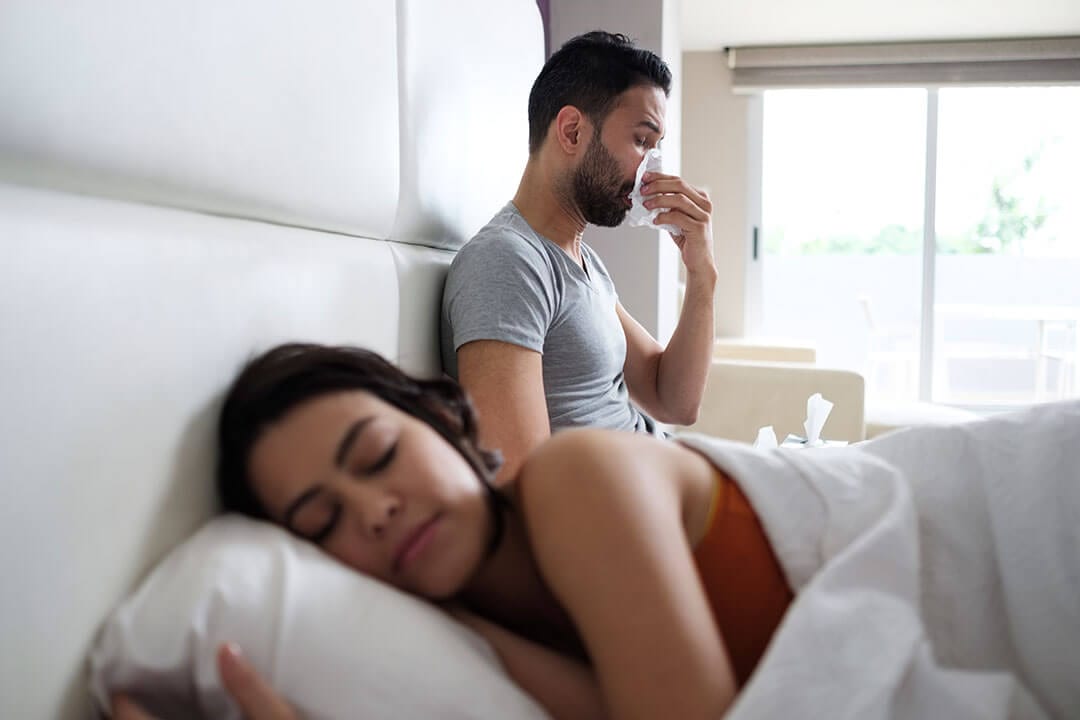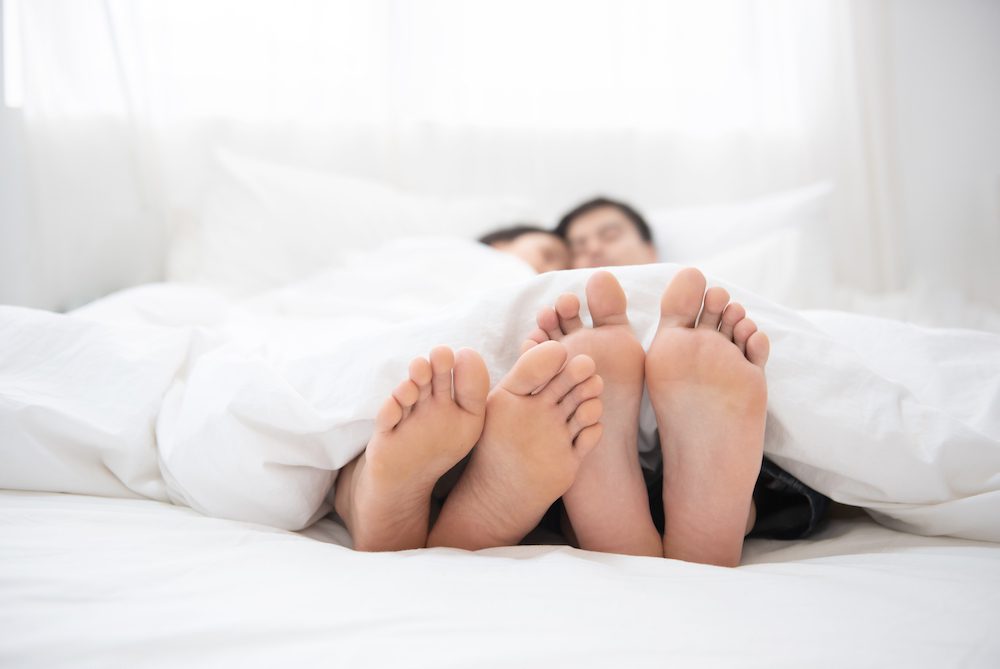It’s not uncommon for some to enjoy an occasional alcoholic beverage— a glass of wine with dinner, a cold beer on a summer night, or a social drink with friends. But as with many good things, alcohol is best enjoyed in moderation.
Too many drinks at once can not only make you feel tipsy and clumsy, but drinking to excess in the evening can also come back to bite you in the morning. Of course, I’m talking about the dreaded hangover that often comes after a long night of heavy drinking. Hopefully for you though, this didn’t involve shenanigans in Las Vegas with tigers or Mike Tyson!
Alcohol and sleep have a very interesting relationship. Alcohol can make it harder for you to get a good night’s sleep, while poor sleep can actually make any hangovers you may have worse. But can a good night’s sleep prevent a hangover?
Before we dive into that though, it’s important to know what effects a hangover has on your body.
Common Hangover Symptoms
If you’ve ever had too much to drink, then you’re likely familiar with these unpleasant hangover symptoms.
- Headache and body aches
- Nausea, vomiting, or upset stomach
- Increased sensitivity to light and sound
- Mood disturbances— such as irritability, anxiety, and depression
- Dizziness
- Dry mouth, dehydration, and excessive thirst
- Poor or insufficient sleep
Why Does Alcohol Cause a Hangover?
Alcohol consumption can create a number of effects in your body— all of which could potentially create your hangover symptoms. Among them are:
- Alcohol causes you to urinate more. Not just because of all the liquid you’re consuming, but the alcohol itself causes your body to produce more urine. This can lead to dehydration.
- Alcohol can cause your blood sugar to drop which can cause fatigue, weakness, and moodiness.
- Alcohol can cause your blood vessels to expand, which can cause headaches.
- Alcohol irritates your stomach and increases stomach acid production. When that happens, you may experience nausea, vomiting, or stomach pain.
All the unpleasant symptoms that come with hangovers drive people to find that elusive “cure” for what ails them. And there are a lot of hangover cures out in the world— we’ll get into these more shortly. But can a good night’s sleep help prevent— or cure— a hangover?
Does Sleep Help a Hangover?
Yes and no. A good night’s sleep won’t prevent a hangover after a night of heavy drinking or cure it once you have one— but it can help reduce the severity of your hangover symptoms.
Short Sleep and Hangover Severity
A study published in Nature and Sleep Science found that people who slept less after an evening of alcohol consumption tended to have greater hangover severity. In the study, researchers observed 578 Dutch university students and found major correlations between total sleep time, alcohol consumption, and the length and severity of hangovers.
Interestingly, total alcohol consumption did not correlate with hangover length or severity. Students who drank the most often did not experience the longest or most severe hangovers, while students who slept the least had the most severe hangovers.
Similarly, a study published in the Journal of Clinical Medicine found that shorter sleep not only increased hangover severity, but also increased cognitive impairment. This study surveyed 99 Australians after a night of drinking alcohol. They answered questions about their alcohol consumption that evening, as well as their sleep quality and hangover symptoms. The survey found that more severe hangovers were connected to not only total sleep time, but also the number of nightly awakenings each person experienced and the impact on the person’s cognitive performance the next morning.
So it’s not just the amount of sleep you get that impacts your hangover symptoms— it’s your sleep quality too. But if you struggle to get a good night’s sleep after a night of drinking, will a nap help?
What About Napping? Will That Help?
Yes— a nap can help you recover from a hangover! A few benefits of napping include:
- Increased alertness.
- Reduced stress.
- Better immunity.
- More creativity— sleep and creativity are actually more closely connected than you may think!
So how can a nap help a hangover? It can actually help you get more quality sleep than you received the night before. For the most productive nap, I recommend keeping it short— less than 90 minutes. Shorter “power naps” can help you reap the benefits of a restful nap, but without the brain fog and confusion you can get from napping for too long!

Is There Such a Thing as a “Hangover Cure”?
There are a lot of hangover “cures” out there. However, most of them are bogus. Here are some of the hangover cures you should avoid:
- “Hair of the dog.” This means consuming more alcohol to reduce your current hangover. Remember, dehydration is a common hangover symptom. If you consume more alcohol while you’re already hungover, you’d be dehydrating yourself further. This, of course, is a bad idea. Try hydrating instead. Similarly…
- Consuming a lot of caffeine. In theory, this caffeine boost is supposed to help sharpen your mind and power you through your hangover. But drinking too much caffeine can also dehydrate you and worsen your hangover.
- Exercising. Make no mistake— exercise is great for the body and the mind, but it’s not a good hangover cure. You can’t sweat out the alcohol in your system— and exercising too hard when you’re already dehydrated can make matters even worse. Also, alcohol interferes with exercise’s benefits for sleep, so when it comes to a good night’s sleep, you may want to reconsider that extra nightcap or glass of wine with dinner. Like I always say, “there’s a big difference between falling asleep and passing out!”
- Vitamin C. While an important nutrient for good health, vitamin C will neither prevent nor cure your hangover. So a glass of orange juice in the morning— or a morning Screwdriver— won’t help you if you’re already hungover.
- Burnt toast. Activated charcoal— a type of carbon— is often used as a way to remove toxins from the body. When you burn your toast, that creates a form of carbon as well. The logic here is that the carbon can help remove the lingering effects of the alcohol from your body. This doesn’t work though. However, dry toast can help settle your stomach if you’re feeling nauseous or queasy the next morning. There is some anecdotal evidence that activated charcoal capsules taken before or right after drinking may help, but this really doesn’t appear to be true. The stomach simply absorbs alcohol too quickly.
There is one surefire “hangover cure” though, but it’s probably not what you expected. Ultimately, the best hangover remedy is prevention. By keeping alcohol consumption in moderation, you can prevent a nasty hangover and protect your sleep.
Remember— Alcohol and Sleep Don't Mix!
For many people struggling to get a good night’s sleep, alcohol is often their sleep aid of choice. And while alcohol’s sedative effect can help you fall asleep faster, sleep and alcohol do not mix. Consuming alcohol before bed affects how much deep sleep and REM sleep you get— so consuming too much can have a serious effect on how restorative your sleep is.
Drinking alcohol before bed can contribute to snoring, and may worsen sleep apnea symptoms. Alcohol relaxes your throat muscles, which can make it easier for your airways to become obstructed. The tissue vibrating in your throat is actually what causes the familiar sound of snoring.
Alcohol can throw off your circadian rhythm too. This is because alcohol can prevent your circadian rhythm from responding to the natural light that keeps it working properly— causing abnormalities and sleep problems. That’s not the only connection between your circadian rhythm and alcohol consumption.
Your circadian rhythm changes throughout the day— that’s why you feel the dreaded afternoon slump right after lunch. These changes in your circadian rhythm can also affect how your body metabolizes alcohol. In short— the same amount of alcohol can have different effects on your body at different times of day or night.
How to Enjoy Alcohol While Avoiding Poor Sleep— And A Hangover
While prevention is the best cure when it comes to hangovers, you don’t have to be a teetotaler to make sure that alcohol doesn’t ruin your sleep or your morning. Here are a few hangover prevention tips that can help you feel bright-eyed and bushy-tailed when morning comes, even after your nightcap.
- Drink lots of water. Remember— a major factor of hangovers and their symptoms is dehydration. If you’re out drinking with friends, try following the 1:1 rule. This means for every alcoholic drink you enjoy, you have a glass of water after. This will not only help keep you hydrated, but also slows down your overall alcohol consumption.
- Get plenty of electrolytes. Water is best for preventing dehydration, but drinking fluids with electrolytes can help your body lose less fluid and can help with any potential headaches. Good sources of electrolytes include sports drinks like Gatorade or Powerade, Pedialyte, or warm broth.
- Stop drinking alcohol at least a few hours before bedtime. This may be the most important one to remember. If you’re just enjoying a drink or two at home, then limiting your alcohol intake to a few hours before bed can do wonders for your sleep quality. This is because drinking in moderation and stopping your intake at least two hours before bed gives your body time to get that alcohol out of your system before you go to sleep.
Is Your Sleep On the Rocks?
It’s okay to enjoy alcohol in moderation, but if it’s ruining your rest it may be a sign of another problem.
If you’re consistently getting less than 7 hours of sleep each night, poor quality sleep, or both, talk to your doctor. They can help you make sense of your symptoms and get tested for sleep disorders. Alcohol can worsen sleep disorders like insomnia and sleep apnea, so getting the proper treatment is vital to getting the healthy sleep you need.
Alcohol and sleep have a very interesting relationship, but you can still enjoy alcohol without ruining your sleep or causing a hangover. Remember— moderation and timing are key!
References
Ask the Sleep Doctor
Have questions about sleep? Submit them here! We use your questions to help us decide topics for articles, videos, and newsletters. We try to answer as many questions as possible. You can also send us an email. Please note, we cannot provide specific medical advice, and always recommend you contact your doctor for any medical matters.



